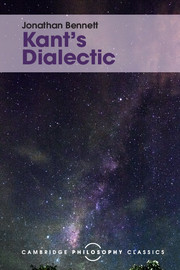Book contents
- Frontmatter
- Contents
- Preface to this edition by Karl Ameriks
- Preface
- System of references
- 1 Introduction
- 2 Concepts and intuitions
- 3 Substances and reality
- 4 The substantiality of the soul
- 5 The simplicity of the soul
- 6 The identity of the soul
- 7 Infinity
- 8 Limits
- 9 Divisibility
- 10 Freedom
- 11 God
- 12 Reason
- Index
- Frontmatter
- Contents
- Preface to this edition by Karl Ameriks
- Preface
- System of references
- 1 Introduction
- 2 Concepts and intuitions
- 3 Substances and reality
- 4 The substantiality of the soul
- 5 The simplicity of the soul
- 6 The identity of the soul
- 7 Infinity
- 8 Limits
- 9 Divisibility
- 10 Freedom
- 11 God
- 12 Reason
- Index
Summary
The third antinomy
Both sides of the third antinomy assume that whatever happens is caused to happen. The Antithesis says that the only causality is the causality of nature, in which an event is caused by something earlier. The Thesis denies this, in the interests of an alleged causality of freedom, in which the cause does not ante-date the effect. The Thesis-argument is a genuine reductio ad absurdum: it offers no positive doctrine of freedom, but rather presents an alleged difficulty in the Antithesis. I shall now examine this.
The Thesis-argument starts by arguing, quite cogently, that in the causality of nature every cause must be an event or happening. If it were a ‘preceding state’ which ‘had always existed’, its effect ‘also would have always existed, and would not have only just arisen’. This is important, for it implies that if every event is caused through the causality of nature then every event is caused by an earlier event which is caused by … and so on, without beginning. So no causal-explanatory chain can be completed, or, as Kant says, there can be ‘no completeness of the series on the side of the causes’.
What is the difficulty about that? Kant seems poised to raise a problem about infinity, but in fact he does no such thing. The argument concludes thus:
The law of nature is just this, that nothing takes place without a cause sufficiently determined a priori. The proposition that no causality is possible save in accordance with laws of nature, when taken in unlimited universality, is therefore self-contradictory; and this cannot, therefore, be regarded as the sole kind of causality.
The whole weight falls on the phrase ‘sufficiently determined a priori’, which Kant, typically, does not explain. Here is Kemp Smith's account of what Kant means:
The vital point of this argument lies in the assertion that the principle of causality calls for a sufficient cause for each event, and that such sufficiency is not to be found in natural causes which are themselves derivative or conditioned [or caused].
According to this, the Thesis-argument claims that we have not assigned a sufficient cause for an event if we have merely adduced something which in turn needs explanation but is not explained.
- Type
- Chapter
- Information
- Kant's Dialectic , pp. 186 - 229Publisher: Cambridge University PressPrint publication year: 2016

